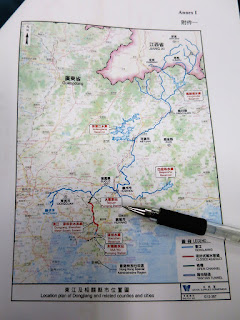The
seminar entitled “Quality Water Supply from Source to Home” was organized by
Hong Kong Society for Quality (HKSQ) and co-organized with ASQ, BCH Dept.,
& SEEM Dept., CityU on 1st Feb 2016. Hong Kong had just celebrated the 50th
anniversary of the supply of Dongjiang water to this Pearl of the East. Incidentally, quality of in drinking water in
the recent months had aroused attention of various stakeholders in Hong Kong. The seminar aimed to share the background of
Dongjiang water and discussed the quality issues. In the beginning, Dr. KS Chin (Former Chairman,
HKSQ; Associate Professor, SEEM Dept., CityU) took a photo with speaker Dr.
Richard Cheung (Associate Professor, BCH Dept., CityU) for memory.
Dr. KS
Chin introduced the guest speaker’s background. Dr. Richard Cheung is a member
of Advisory Committee on the Quality of Water Supplies and Resources
established by the Water Supplies Department of the Government of the Hong Kong
Special Administrative Region. He is also a member of the Steering Committee
for the "Quality Restaurant Environmental Management Scheme" funded
by the Environmental Conservation Fund.
Firstly, Dr.
Richard Cheung said that Dong Jiang Water was the major source of Hong Kong’s
water supply which upto 70% to 80% of our drinking water.
Then he showed the map to explain Dong Jiang water come from Xinfengjiang Reservoir to Taijuan Pumping Station and then through the closed aqueduct (Red color line) to Shenzhen Reservoir. Hong Kong draw water from Muk Wu Pumping Station.
The
Closed Aqueduct passed different mountains through many pumping system to
supply Hong Kong. It is a great
engineering work.
After
briefing the source, Dr. Cheung introduced the Water Supplies Department (WSD)
website in which contained much information such as WHO guidelines for Drinking
water Quality as follows:
Part A –
Microbiological quality
Part B –
Chemicals of health significance as described by WHO’s Guidelines for Drinking
Water Quality (WHO 2011)
Part C –
Radiological quality
Part D –
Other parameters
Based on Centre for Health Protection advice, we had better run water for 2 to 3 minutes prior to using it form drinking and food preparation. However, Dr. Cheung said if seldom people would use NSF 53 standard water because the water flow was too slow.
Lastly,
Dr. Cheung arose several challenges for Quality Personnel below for discussion.
a)
Hardware (various parts of the plumbing system)
b)
Personnel training and supervision of procedure during construction
c)
Testing and Certification of the finally completed plumbing system
d)
Routine testing of Water Quality
Q&A
During the
discussion, I said that I had measured city & rural area’s air participates
(20 years ago) which contained lead in 0.158µg/m^3 and 0.114µg/m^3, respectively.
Minda had
asked Doctor (specialist for children) who said most of pregnant woman would like
to eat more fish than normal. Sea fish
contained much more lead. So lead could be come from food.
At end
of the seminar, Dr. KS Chin (Former Chairman, HKSQ) presented a souvenir to Dr.
Richard Cheung.
Reference:
HKSQ - www.hksq.org
BCH
Dept., CityU – http://www6.cityu.edu.hk/bhdbapp/deptweb/index.html
SEEM
Dept., CityU – http://www.cityu.edu.hk/seem/










沒有留言:
發佈留言